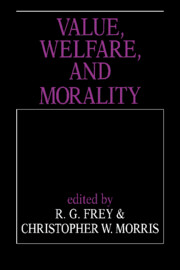Book contents
- Frontmatter
- Contents
- List of contributors
- Preface
- 1 Value, welfare, and morality
- 2 The land of lost content
- 3 Putting rationality in its place
- 4 Can a Humean be moderate?
- 5 Welfare, preference, and rationality
- 6 Preference
- 7 Reason and needs
- 8 Desired desires
- 9 On the winding road from good to right
- 10 Value, reasons, and the sense of justice
- 11 Agent-relativity of value, deontic restraints, and self-ownership
- 12 Agent-relativity – the very idea
- 13 The separateness of persons, distributive norms, and moral theory
- 14 Harmful goods, harmless bads
10 - Value, reasons, and the sense of justice
Published online by Cambridge University Press: 07 December 2009
- Frontmatter
- Contents
- List of contributors
- Preface
- 1 Value, welfare, and morality
- 2 The land of lost content
- 3 Putting rationality in its place
- 4 Can a Humean be moderate?
- 5 Welfare, preference, and rationality
- 6 Preference
- 7 Reason and needs
- 8 Desired desires
- 9 On the winding road from good to right
- 10 Value, reasons, and the sense of justice
- 11 Agent-relativity of value, deontic restraints, and self-ownership
- 12 Agent-relativity – the very idea
- 13 The separateness of persons, distributive norms, and moral theory
- 14 Harmful goods, harmless bads
Summary
Introduction
In this essay I want to sketch some features of moral dispositions and their relation to values and reasons for acting that I have either ignored or oversimplified in previous work. In Morals by Agreement I treated morality primarily as an artifice that enables rational agents to reach agreement with their fellows about the distribution of the fruits of their interaction and to adhere to these agreements against considerations of present advantage. I outlined a very crude derivation of moral dispositions from the demands of practical rationality, understood in a variant of the maximizing way that has become orthodox in economics and the theory of rational choice. But one might also and quite properly consider morality not as an artifice but as a set of natural dispositions. Although I introduced such an idea in Morals by Agreement, it played no part in the central arguments of my book. Here I begin from the idea of a natural morality, and consider its place in rational agency conceived somewhat more broadly than in rational choice. To focus and limit my account I shall treat the sense of justice as characteristic of moral dispositions, and examine its role in moral deliberation and evaluation. Much of what I have to say is very rough, omitting refinements and qualifications that if pursued might prove to undermine some of the positions that I shall endorse.
Information
- Type
- Chapter
- Information
- Value, Welfare, and Morality , pp. 180 - 208Publisher: Cambridge University PressPrint publication year: 1993
Accessibility standard: Unknown
- 2
- Cited by
